Police move in on anti-coal activists at German protest camp
Author: AFP |Update: 12.01.2023

Policemen on a lifting platform prepare to remove an anti-coal activist sitting on a giant yellow X sculpture on January 10, 2023 in Luetzerath, western Germany / © AFP
German police on Tuesday began removing climate activists perched precariously on high structures as they embarked on a "dangerous" operation to evacuate a protest camp that has become a symbol of resistance against fossil fuels.
Luetzerath, a village in North Rhine-Westphalia state, was once home to around 100 people but has been abandoned over the years as uncertainty hung over its planned evacuation for the expansion of the neighbouring coal mine Garzweiler.
Since the last resident, a farmer, packed up and left in October 2022, the village has been turned over to around 2,000 anti-coal activists who are trying to prevent the site from being dug up for coal.
The activists have built barricades and dug trenches to stop police getting in. Some are also swinging on hammocks erected high up above ground.
The protesters have vowed that there will be "no limits" in its defence of the site, and that they would make an "active defence" of the village.

The activists in Luetzrath have set up an intricate, self-built camp in the trees, linked by a network of ropes and cables, which has been designed to make evacuation difficult / © AFP
"We've left a few surprises for the police," said Joey, 28, a balaclava-clad former surgical assistant who is now a veteran of the occupation of the village.
"Most of the people will choose a passive defence (of the village), but others will act with active defence. There will be no limit.
"It may sound harsh but there are bigger things coming with climate change, people are dying".
Joey said he only fears the violence could escalate the longer the occupation goes on and far from the watchful eye of the media, who will be forced to leave once the operation begins.
- A 'long night' -
Environmental groups had hoped that Luezerath would be spared the excavators after Chancellor Olaf Scholz's coalition including the Green party took office in December 2021 with a vow to phase out coal usage.
But Russia's war in Ukraine has sparked an energy crisis, forcing Berlin to restart mothballed coal plants to secure Germany's power needs.
In the scramble for energy sources as Russia dwindled its supply, Scholz's government granted permission to German energy company RWE to expand the mine neighbouring Luetzerath.

An activist wearing a space blanket sitting high in a self-built structure in the western German village of Luetzerath / © AFP
To clear the protest camp, which is situated on the edge of the Garzweiler mine, the police must overcome walls of barricades, chicanes and trenches dug by the activists.
The activists -- who have planned another demonstration for Saturday -- have set up an intricate, self-built camp in the trees, linked by a network of ropes and cables, which has been designed to make evacuation difficult.
To avoid injuring the protesters, the police will need to enter the village using heavy vehicles including cranes equipped with lifting platforms, to remove the activists one by one.
Each occupant is prepared to stay for hours or even days holed up in the self-built constructions, protected by little more than a tipi.
"The night might be long" a female German activist, who preferred to remain anonymous, told AFP, warming herself around a fire with several other demonstrators.
"We learn day by day, with communication with those who are here for longer than us."
One male activist told AFP he was worried the protesters may not have enough supplies to withstand the forced expulsion.
"I feel concern because we need 2,000 more litres of water to build the trenches.
"We are supposed to receive 20 litres per person, but I doubt it."
- A siege -
In the huge barn that once belonged to the last evicted farmer from Luetzerath, the activists have set up their headquarters.

To clear the protest camp police must overcome walls of barricades, chicanes and trenches dug by the activists / © AFP
The windows and doors have been barricaded, making access almost impossible for the police, while hundreds of sleeping bags are laid out on the floor of the old straw-strewn cattle pens.
"During the arrests, everyone can decide whether or not to show their identity papers", said one of the organisers at a candle-lit meeting on Monday evening.
They have prepared for a state of siege that could last weeks, as access to the camp is now blocked from outside with police checkpoints and constant patrols.
Author: AFP |Update: 12.01.2023

Policemen on a lifting platform prepare to remove an anti-coal activist sitting on a giant yellow X sculpture on January 10, 2023 in Luetzerath, western Germany / © AFP
German police on Tuesday began removing climate activists perched precariously on high structures as they embarked on a "dangerous" operation to evacuate a protest camp that has become a symbol of resistance against fossil fuels.
Luetzerath, a village in North Rhine-Westphalia state, was once home to around 100 people but has been abandoned over the years as uncertainty hung over its planned evacuation for the expansion of the neighbouring coal mine Garzweiler.
Since the last resident, a farmer, packed up and left in October 2022, the village has been turned over to around 2,000 anti-coal activists who are trying to prevent the site from being dug up for coal.
The activists have built barricades and dug trenches to stop police getting in. Some are also swinging on hammocks erected high up above ground.
The protesters have vowed that there will be "no limits" in its defence of the site, and that they would make an "active defence" of the village.

The activists in Luetzrath have set up an intricate, self-built camp in the trees, linked by a network of ropes and cables, which has been designed to make evacuation difficult / © AFP
"We've left a few surprises for the police," said Joey, 28, a balaclava-clad former surgical assistant who is now a veteran of the occupation of the village.
"Most of the people will choose a passive defence (of the village), but others will act with active defence. There will be no limit.
"It may sound harsh but there are bigger things coming with climate change, people are dying".
Joey said he only fears the violence could escalate the longer the occupation goes on and far from the watchful eye of the media, who will be forced to leave once the operation begins.
- A 'long night' -
Environmental groups had hoped that Luezerath would be spared the excavators after Chancellor Olaf Scholz's coalition including the Green party took office in December 2021 with a vow to phase out coal usage.
But Russia's war in Ukraine has sparked an energy crisis, forcing Berlin to restart mothballed coal plants to secure Germany's power needs.
In the scramble for energy sources as Russia dwindled its supply, Scholz's government granted permission to German energy company RWE to expand the mine neighbouring Luetzerath.

An activist wearing a space blanket sitting high in a self-built structure in the western German village of Luetzerath / © AFP
To clear the protest camp, which is situated on the edge of the Garzweiler mine, the police must overcome walls of barricades, chicanes and trenches dug by the activists.
The activists -- who have planned another demonstration for Saturday -- have set up an intricate, self-built camp in the trees, linked by a network of ropes and cables, which has been designed to make evacuation difficult.
To avoid injuring the protesters, the police will need to enter the village using heavy vehicles including cranes equipped with lifting platforms, to remove the activists one by one.
Each occupant is prepared to stay for hours or even days holed up in the self-built constructions, protected by little more than a tipi.
"The night might be long" a female German activist, who preferred to remain anonymous, told AFP, warming herself around a fire with several other demonstrators.
"We learn day by day, with communication with those who are here for longer than us."
One male activist told AFP he was worried the protesters may not have enough supplies to withstand the forced expulsion.
"I feel concern because we need 2,000 more litres of water to build the trenches.
"We are supposed to receive 20 litres per person, but I doubt it."
- A siege -
In the huge barn that once belonged to the last evicted farmer from Luetzerath, the activists have set up their headquarters.

To clear the protest camp police must overcome walls of barricades, chicanes and trenches dug by the activists / © AFP
The windows and doors have been barricaded, making access almost impossible for the police, while hundreds of sleeping bags are laid out on the floor of the old straw-strewn cattle pens.
"During the arrests, everyone can decide whether or not to show their identity papers", said one of the organisers at a candle-lit meeting on Monday evening.
They have prepared for a state of siege that could last weeks, as access to the camp is now blocked from outside with police checkpoints and constant patrols.
Issued on: 12/01/2023 -
Police have began evicting around 200 anti-coal activists from the town
© INA FASSBENDER / AFP
Berlin (AFP) – Climate activists occupied the regional office of Germany's vice chancellor Thursday in a show of support for a flagship anti-coal protest, accusing the Green party politician of betrayal.
The Ende Gelaende group said on Twitter that it had broken into Economy Minister Robert Habeck's office in the northern town of Flensburg.
"We stand in solidarity with all the people who are defending Luetzerath!" the group said, posting images of an open window with a banner hanging beneath it.
The western town of Luetzerath became a flashpoint for climate protests when the government decided in 2022 to press ahead with plans to demolish it to allow the expansion of a nearby coal mine.
The decision came in spite of a pledge to phase out coal by 2030, but the government -- a coalition that includes the Greens -- blamed the energy squeeze caused by Russia's invasion of Ukraine.
Police on Wednesday began evicting around 200 anti-coal activists from the town, an operation that is expected to take several weeks.
"Robert Habeck is largely responsible for the violent eviction of Luetzerath," Ende Gelaende said, adding that even phasing out coal by 2030 was "not compatible with the Paris climate agreement".
"The Greens have thus once again betrayed their own ideals," the group said.
Police on Thursday continued with efforts to oust the protesters.
Many of the activists have built structures high up in the trees, while others have climbed to the top of abandoned buildings and barns in a bid to complicate the evacuation effort.
Videos shared on social media showing the felling of trees.
Police also said they were checking reports of an underground tunnel system beneath the site.
Swedish climate activist Greta Thunberg is expected to join a demonstration near the protest camp this weekend.
© 2023 AFP
Berlin (AFP) – Climate activists occupied the regional office of Germany's vice chancellor Thursday in a show of support for a flagship anti-coal protest, accusing the Green party politician of betrayal.
The Ende Gelaende group said on Twitter that it had broken into Economy Minister Robert Habeck's office in the northern town of Flensburg.
"We stand in solidarity with all the people who are defending Luetzerath!" the group said, posting images of an open window with a banner hanging beneath it.
The western town of Luetzerath became a flashpoint for climate protests when the government decided in 2022 to press ahead with plans to demolish it to allow the expansion of a nearby coal mine.
The decision came in spite of a pledge to phase out coal by 2030, but the government -- a coalition that includes the Greens -- blamed the energy squeeze caused by Russia's invasion of Ukraine.
Police on Wednesday began evicting around 200 anti-coal activists from the town, an operation that is expected to take several weeks.
"Robert Habeck is largely responsible for the violent eviction of Luetzerath," Ende Gelaende said, adding that even phasing out coal by 2030 was "not compatible with the Paris climate agreement".
"The Greens have thus once again betrayed their own ideals," the group said.
Police on Thursday continued with efforts to oust the protesters.
Many of the activists have built structures high up in the trees, while others have climbed to the top of abandoned buildings and barns in a bid to complicate the evacuation effort.
Videos shared on social media showing the felling of trees.
Police also said they were checking reports of an underground tunnel system beneath the site.
Swedish climate activist Greta Thunberg is expected to join a demonstration near the protest camp this weekend.
© 2023 AFP
In Pictures
Gallery|Climate Crisis
German police begin clearing coal mine protest camp in Luetzerath
The expansion of a lignite mine has highlighted tensions around Germany’s climate policy during the energy crisis.
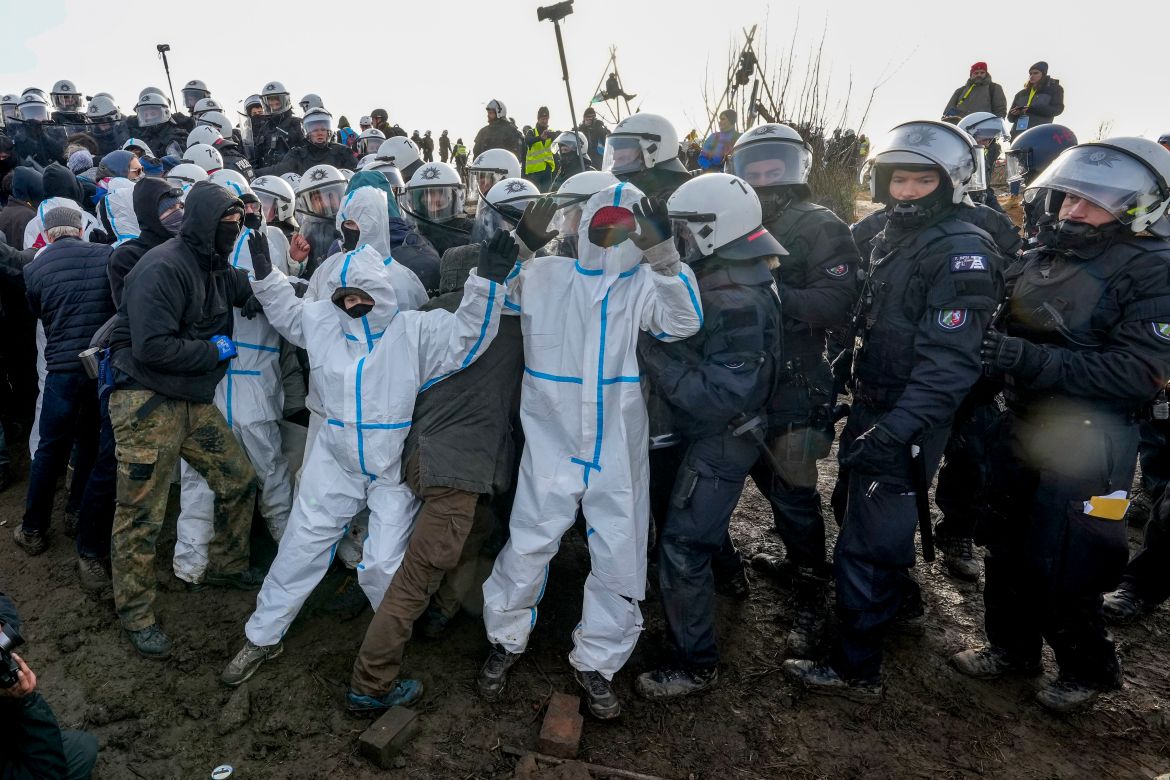
Published On 12 Jan 2023
Police in riot gear have begun evicting climate activists from a condemned village in western Germany that is due to be demolished for the expansion of a coal mine.
Some stones and fireworks were thrown on Wednesday as officers entered the tiny hamlet of Luetzerath, which has become a flashpoint of debate over the country’s climate efforts.
Police spokesman Andreas Mueller said the attacks on officers were “not nice” but noted that most of the protests so far had been peaceful.
He said police would stick to their tactic of trying to avoid any escalation by offering to let any activists who leave on their own accord to do so without facing further police measures or prosecution.
“I’m really afraid today,” Petra Mueller, a 53-year-old local who had been at the site for several days, said from a top-floor window of one of the few remaining houses. Mueller said she still held out hope of preserving what is left of Luetzerath “until nothing is left standing; hope dies last”.
Environmentalists say bulldozing the village to expand the nearby Garzweiler coal mine would result in huge amounts of greenhouse gas emissions. The government and utility company RWE argue that coal is needed to ensure Germany’s energy security.
However, a study by the German Institute for Economic Research calls into question the government’s stance. Its authors found other existing coal fields could be used instead, though the cost to RWE would be greater.
Another alternative would be for Germany to increase the production of renewable power, cut demand through energy efficiency measures, or import more coal or gas from abroad, the study found.
Some activists expressed particular anger at the environmentalist Green party, which is part of the regional and national governments that reached a deal with RWE last year allowing it to destroy the village in return for ending coal use by 2030, rather than 2038.
“I think climate protection and protests need symbols but the empty hamlet of Luetzerath, where no one lives any more, is the wrong symbol from my point of view,” Vice Chancellor Robert Habeck, a Green who is Germany’s economy and climate minister, told reporters in Berlin.
Climate campaigners counter that expanding a massive open-cast coal mine goes against Germany’s international commitments to reduce emissions of planet-warming greenhouse gases. The country is expected to miss its ambitious targets for the second year in a row.
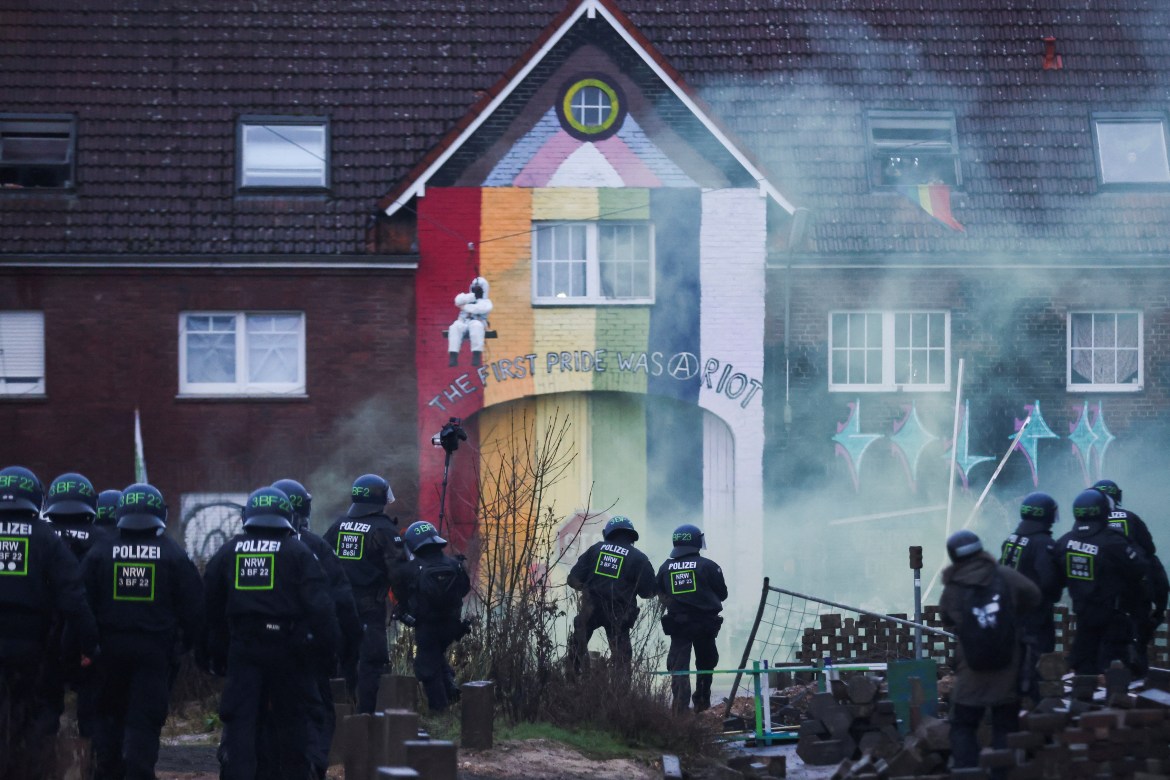
Gallery|Climate Crisis
German police begin clearing coal mine protest camp in Luetzerath
The expansion of a lignite mine has highlighted tensions around Germany’s climate policy during the energy crisis.

Protesters clash with police officers next to the Garzweiler lignite opencast mine.
Michael Probst/AP Photo
Published On 12 Jan 2023
Police in riot gear have begun evicting climate activists from a condemned village in western Germany that is due to be demolished for the expansion of a coal mine.
Some stones and fireworks were thrown on Wednesday as officers entered the tiny hamlet of Luetzerath, which has become a flashpoint of debate over the country’s climate efforts.
Police spokesman Andreas Mueller said the attacks on officers were “not nice” but noted that most of the protests so far had been peaceful.
He said police would stick to their tactic of trying to avoid any escalation by offering to let any activists who leave on their own accord to do so without facing further police measures or prosecution.
“I’m really afraid today,” Petra Mueller, a 53-year-old local who had been at the site for several days, said from a top-floor window of one of the few remaining houses. Mueller said she still held out hope of preserving what is left of Luetzerath “until nothing is left standing; hope dies last”.
Environmentalists say bulldozing the village to expand the nearby Garzweiler coal mine would result in huge amounts of greenhouse gas emissions. The government and utility company RWE argue that coal is needed to ensure Germany’s energy security.
However, a study by the German Institute for Economic Research calls into question the government’s stance. Its authors found other existing coal fields could be used instead, though the cost to RWE would be greater.
Another alternative would be for Germany to increase the production of renewable power, cut demand through energy efficiency measures, or import more coal or gas from abroad, the study found.
Some activists expressed particular anger at the environmentalist Green party, which is part of the regional and national governments that reached a deal with RWE last year allowing it to destroy the village in return for ending coal use by 2030, rather than 2038.
“I think climate protection and protests need symbols but the empty hamlet of Luetzerath, where no one lives any more, is the wrong symbol from my point of view,” Vice Chancellor Robert Habeck, a Green who is Germany’s economy and climate minister, told reporters in Berlin.
Climate campaigners counter that expanding a massive open-cast coal mine goes against Germany’s international commitments to reduce emissions of planet-warming greenhouse gases. The country is expected to miss its ambitious targets for the second year in a row.

Police officers keep guard as activists stage a sit-in protest against the expansion of the lignite mine in Luetzerath. Andreas Mueller, the police spokesman, said authorities were prepared for the eviction operation to last weeks, if necessary. [Thilo Schmuelgen/Reuters]
Advertisement
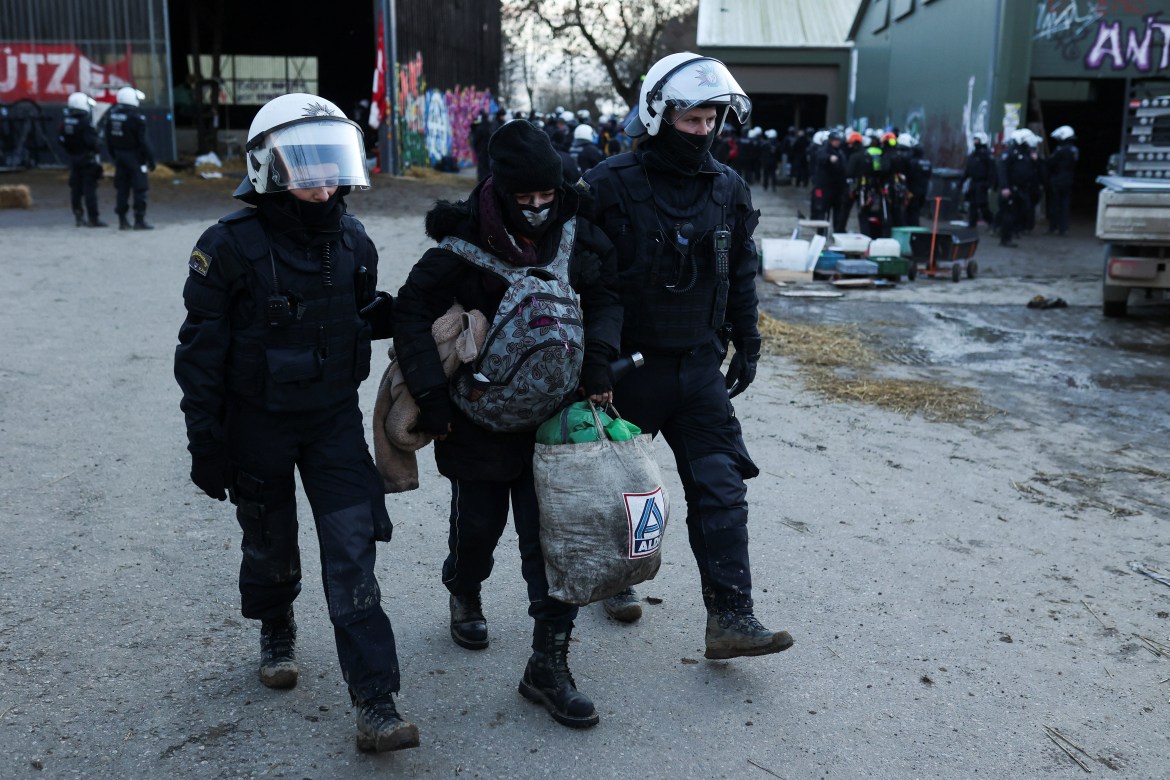
Advertisement

Police officers detain an activist in Luetzerath. RWE said in a statement that a 1.5km (1-mile) fence will be built around the site. [Thilo Schmuelgen/Reuters]


As the officers moved in, some activists perched on the roofs or the windows of the abandoned buildings, chanting and shouting slogans. [Thilo Schmuelgen/Reuters]


Police officers try to evict activists from the tree houses. RWE appealed to activists to peacefully 'end the illegal occupation' of the site. [Christian Mang/Reuters]
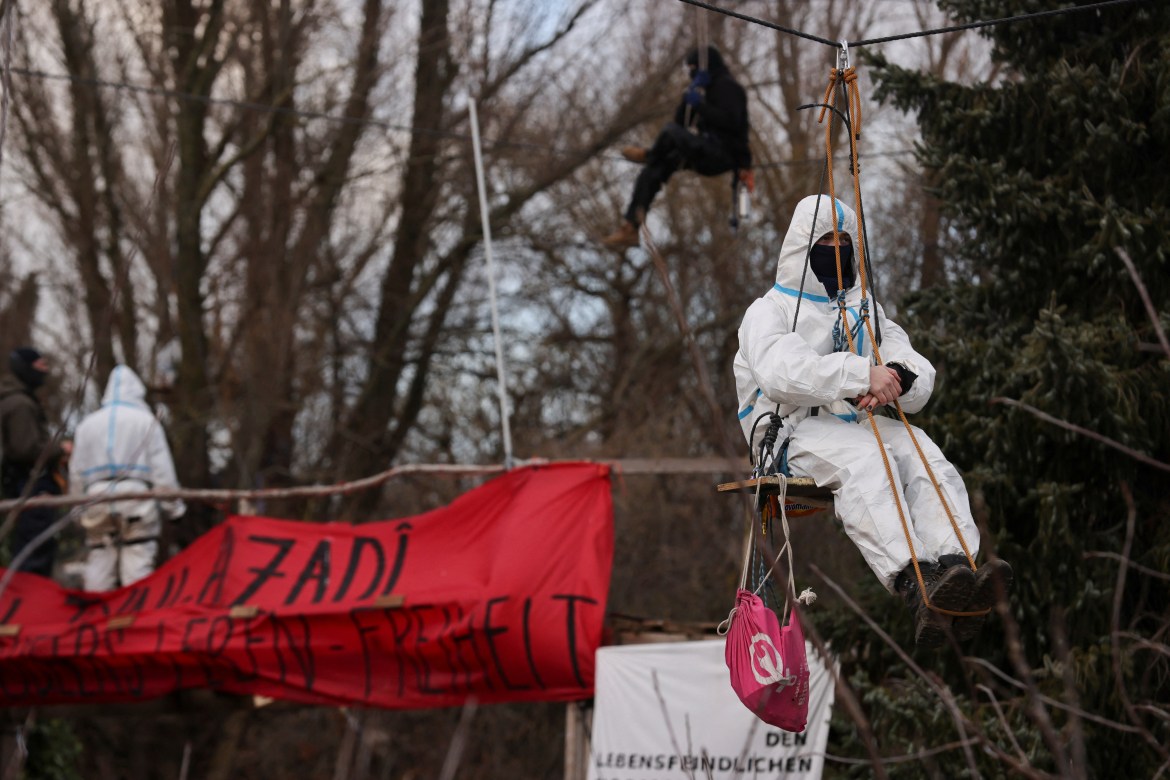

The project has underscored Germany's dilemma over climate policy, which environmentalists say has taken a back seat during the energy crisis that has hit Europe after Russia's invasion of Ukraine, forcing a return to dirtier fuels. [Thilo Schmuelgen/Reuters]
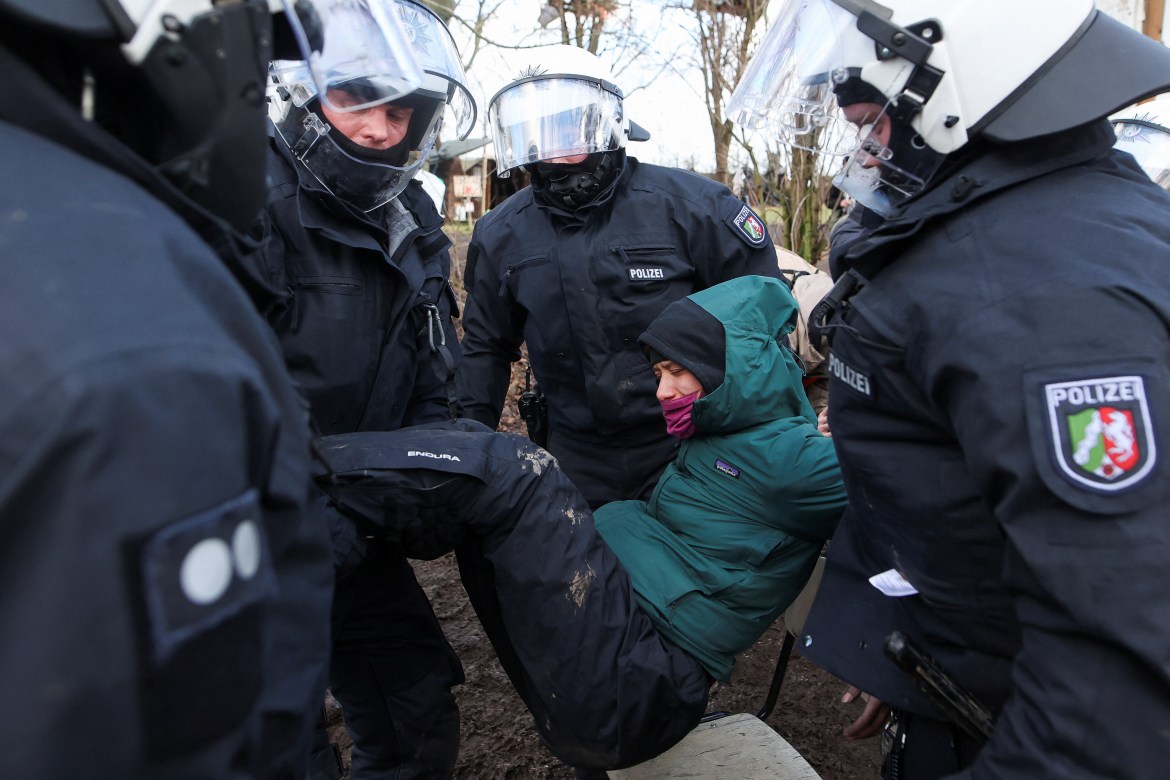

Police, who had water cannon trucks on standby, led away and carried some protesters from the site. [Thilo Schmuelgen/Reuters]
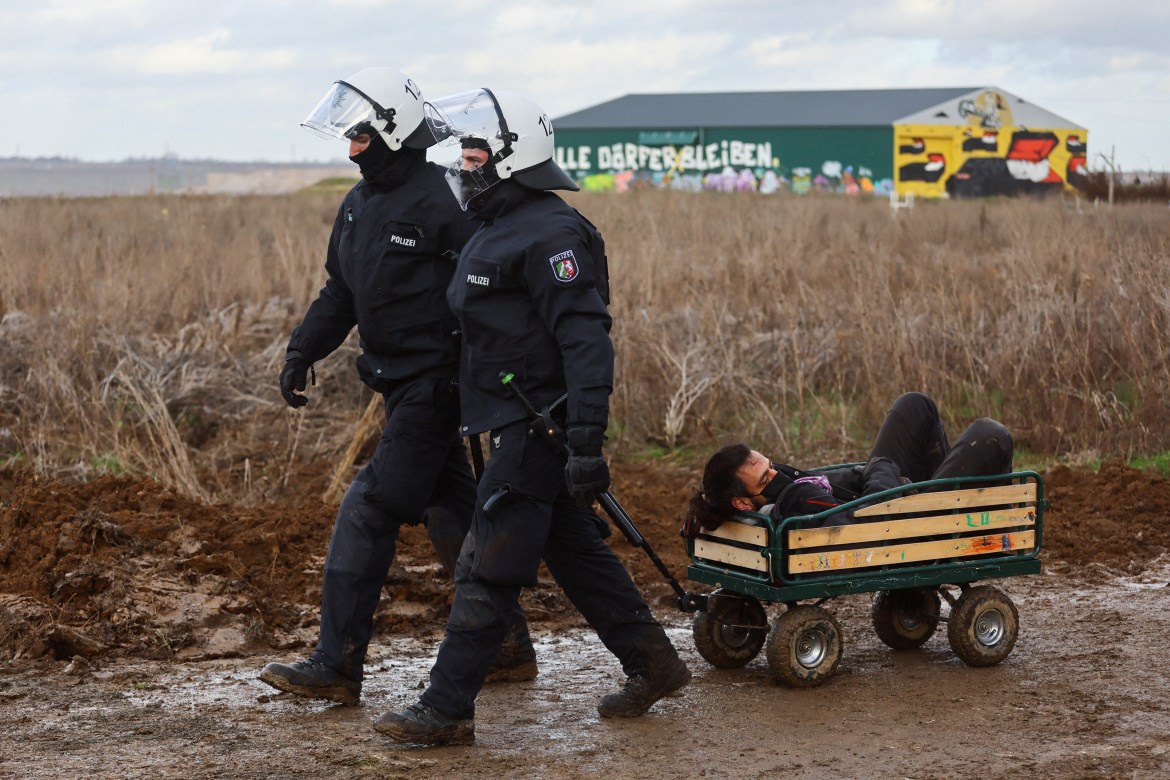

Police officers take away an activist on a trolley. [Wolfgang Rattay/Reuters]
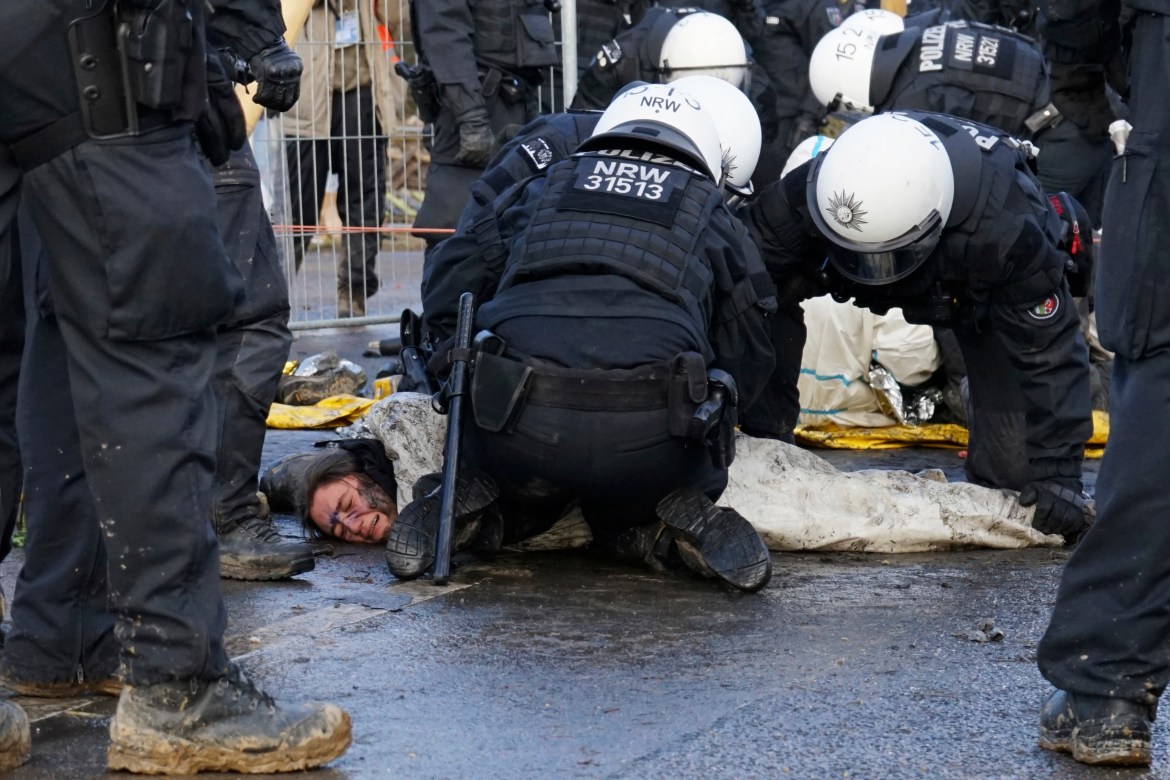

A protester writhes in pain as she’s pinned down by police officers trying to clear a blocked road. [Frank Jordans/AP Photo]
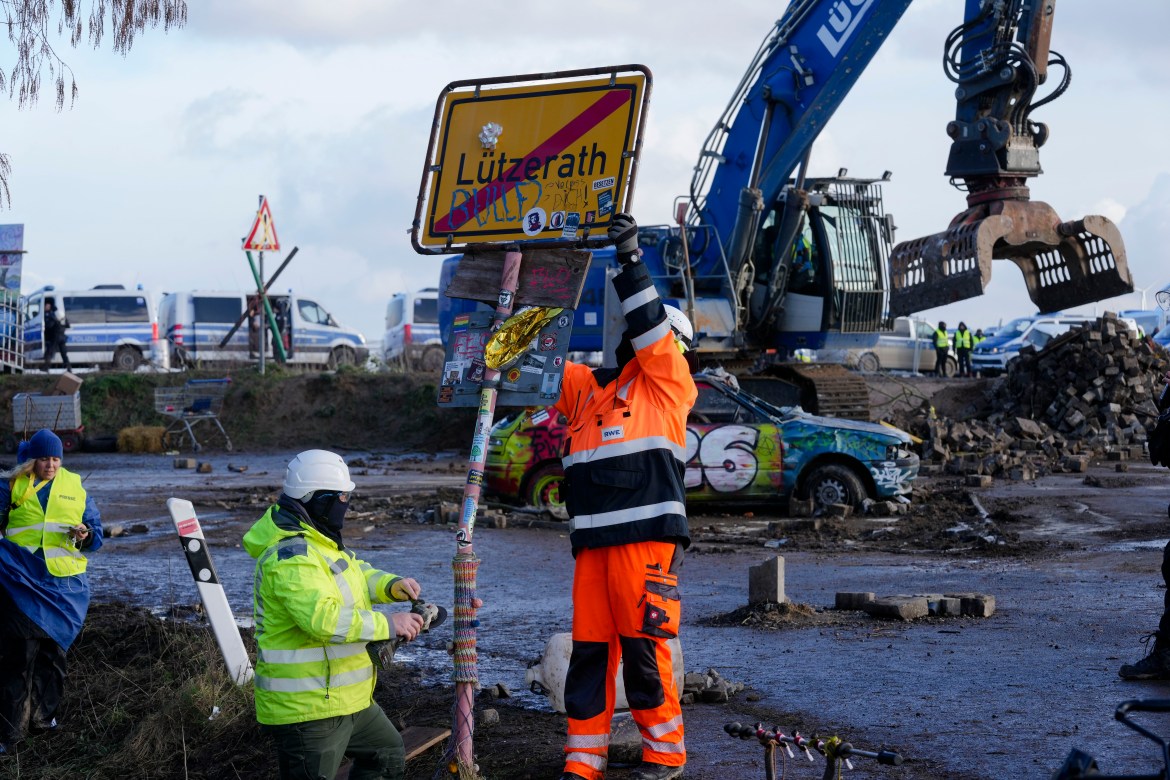

Workers of the German energy company RWE take down the place sign at the village of Luetzerath. [Michael Probst/AP Photo]
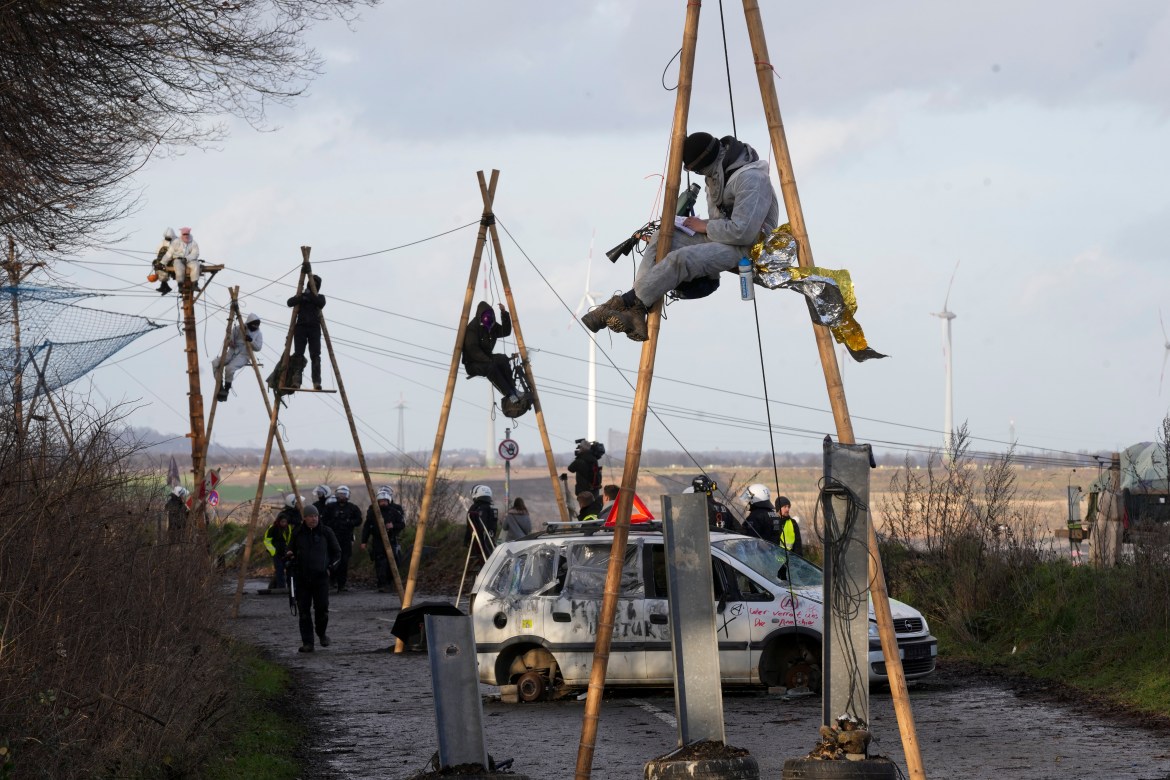

Climate activists sit in so-called tripos and block a road that leads to the village of Luetzerath. [Michael Probst/AP Photo]


Police officers stand in front of a barricade at the village of Luetzerath. [Michael Probst/AP Photo]
FULL COVERAGE BY DEUTCHE WELLE (DW)

No comments:
Post a Comment